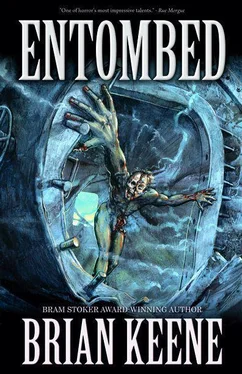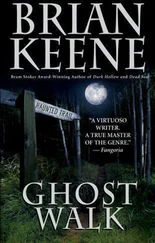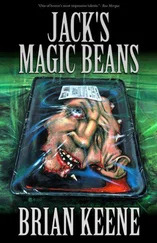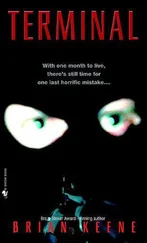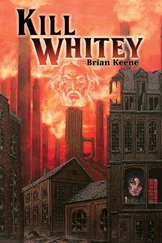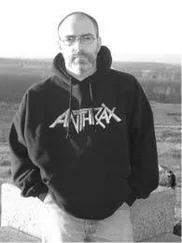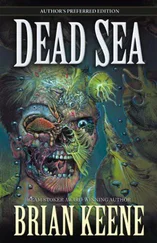As I walked toward the exit, bloody box-cutter in hand, I heard that strange sound again. This time, I was definitely sure it was a voice, but it was still too faint and disjointed to figure out who was speaking. I tried humming to make it go away, but it remained, ethereal and persistent.
“Ready or not,” I said, “here I come.”
I opened the door and stepped boldly out into the hall, not caring if someone saw me or not. In truth, I wanted them to see me. I wanted them to be afraid. I wanted them to know that death was coming for them, not at the hands of some shambling, rotting corpse, but a living, breathing human being—a man who still possessed that spark we call a soul. A man whose soul they had collaborated to snuff out.
It turned out that I was indeed spotted almost immediately. Down at the far end of the corridor, Mike knelt over Clyde. When he saw me coming, he jumped up and ran toward me. I kept the same unhurried pace, as if I were just out for a leisurely Sunday afternoon stroll. The door swung shut behind me, once again muting the noise of the power plant.
When Mike had crossed about half the distance between us, he stopped short and stood there gaping at me. I must have made quite a horrific sight, covered in gore and grinning like a madman. Except that it wasn’t gore. It was my new skin. And I definitely wasn’t crazy. I’ve always believed that if you start out sane, you know when you cross over into insanity. That’s the way it always works, right? When these people on the news finally snap and shoot up their office or their school or butcher their families and loved ones, they usually kill themselves afterward. That’s because they know the enormity of what they’ve done. They know it was an act of insanity, and they can’t bare to live with the consequences. That was how I knew I wasn’t crazy. Not only could I live with the consequences of what I was doing—I was relishing them. It was the consequences of what I was doing that were keeping me alive. My only regret was that I hadn’t figured that out earlier. Maybe then I wouldn’t have wasted so much time feeling guilty over what I’d done to Krantz or the others.
Mike continued to stare at me. His expression was one of shocked disbelief. Then he turned around and fled down the hall.
I laughed. “That’s no good, Mike. Where are you going to run to? The blast door is your only exit.”
If he heard me, he gave no indication. He raced past Clyde without pause and clambered up onto the closest forklift. Still laughing, I continued walking toward him, purposely taking my time in order to draw things out. The laughter felt like ashes in my throat a moment later when Mike turned on one of the propane bottles and then started the forklift. Earlier, I hadn’t thought to check if the keys were still in the ignitions. Obviously, Mike had. The engine choked and sputtered, and then roared to life.
“Hey,” I shouted, stopping in my tracks. This wasn’t what I had expected. “What the hell are you doing, Mike?”
Ignoring me, he fumbled with the shift. The gears grumbled and the hydraulics whined, and then Mike gave it gas, backing the forklift out of the cul-de-sac and whipping it around to face me. His expression—a strange, desperate mix of fear and determination—probably should have unnerved me, but it didn’t. Instead, it just made me start laughing again.
“Okay, Mike. Is this the way you want it? Come on, then!”
I stuck the box-cutter in my back pocket and pulled off my bloody shirt. While I was pulling the shirt over my head, Mike floored it and the forklift shot toward me, racing past Clyde’s still form. The hydraulics shrieked at a fevered pitch. The heavy steel forks banged and clanked. I ripped the shirt free and dangled it in front of me with both hands, waving it back and forth like a bullfighter in the ring.
“Come on, motherfucker. Toro! TORO!”
He gave it more gas and the forklift barreled down the corridor. I stood in the middle of the hallway, my feet spread shoulder-width apart and my knees locked, frantically urging him on with my makeshift matador cape. Mike shouted—a long, unintelligible cry of frustration and anger and fear. He hunched over the steering wheel, gripping it tight, and zeroed the forks in on me. I waited until the very last moment and then jumped aside. The forklift zipped past me. I grabbed one of the roll cage bars and pulled myself up onto the machine. I coughed, tasting exhaust fumes in the back of my throat.
Mike tried to push me off with one hand while he steered with the other, but I was ready for him. I slashed at the back of his hand with the box-cutter. The razor sliced deep, opening a long gash that ran from between the knuckles of his middle and ring fingers all the way down to his wrist. Shrieking, Mike yanked his hand away, but I slashed again, cutting his wrist and forearm. I expected him to punch me or try pushing me off again, or maybe crash us into the wall, but instead of doing that, Mike dove off the other side of the forklift and rolled across the floor. Immediately, the forklift began to lose speed and waver out of control, heading for the wall. The engine stuttered. I quickly slid into the driver’s seat and took control of the wheel. Then I turned around. My arc was too wide and the forks scraped against the wall, gouging into the concrete.
I’d expected to see Mike fleeing down the corridor again, but instead, he lay on the floor, half-curled into the fetal position, and cradling his right ankle. His lips were drawn back in an anguished sneer, exposing nicotine-stained teeth, and his eyes were squeezed shut. Tears ran down his face.
“Did you break your ankle, Mike?” I shouted over the engine. “Gee, that’s a tough break.”
I maneuvered toward him.
“Get it, Mike? I said that’s a tough break.”
Moaning, he tried to stand up. His injured ankle buckled beneath him and he fell down again. His whimpers turned to screams as he began to crawl away, dragging his leg behind him.
I shook my head. “Some people just don’t have a sense of humor.”
Mike screamed in response.
I took my foot off the brake and eased the forklift forward. Then I stomped the accelerator. The forks and chassis blocked my view of Mike, but my aim was true. The fat tires crunched up and over his body, silencing his cries. The entire forklift bounced and jostled, as if I’d hit a particularly large pothole. Then it smoothed out again. I glanced behind me and smiled with approval. His head and pelvis had both been crushed, leaving behind a flattened, twisted thing and crimson tire tracks.
I heard the voice again. This time it was louder. Clearer. It sounded just like Alyssa, but that couldn’t be.
“Pete, they’re coming…”
“Alyssa?”
There was no response. I turned around and faced forward in my seat, intent on parking the forklift back in the cul-de-sac. Instead, I jerked in surprise when I saw Ritchie coming out of the shower room. He and the others hadn’t been able to break my blockade in the power plant, so while I’d been busy taking care of Mike, Ritchie had shimmied up the incinerator chute, just as I’d done earlier.
Ritchie’s eyes widened when he saw me. He glanced at Clyde, still sitting slumped over with his back against the wall, and then he turned back to me and Mike. For a moment, I thought he might charge me, and perhaps try to jump up into the cab the same way I’d done with Mike. He must have panicked, however, because instead of doing that or retreating to the restrooms, he darted the rest of the way out into the hall and ran towards the blast door. I stomped the accelerator and sped after him. As I passed by the shower room, I saw a second figure fleeing into the restroom. The door swung shut before I could determine who it was.
Читать дальше
